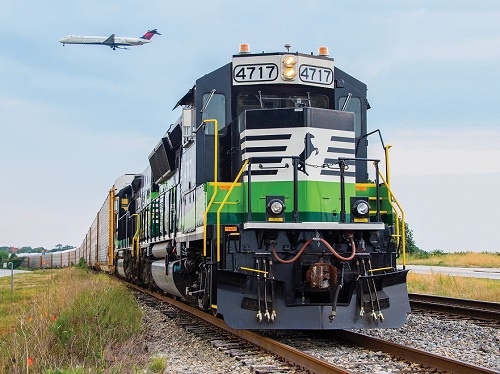The Georgia Department of Transportation recently approved an $8.4 million grant to Norfolk Southern Corp. to help fund its McDonough passing track improvement – the largest of six grants in total from the first round of funding from the newly created Georgia Freight Rail Program.
[Above photo by Norfolk Southern]
Administered by the agency and subject to annual appropriations through the legislature, the Georgia Freight Rail Program – established by the state legislature in 2021 – aims to boost investment in freight rail for public benefit. Both Class 1 and Short line rail lines are eligible for grants through this program, the Georgia DOT noted.
This particular Norfolk Southern freight rail project – estimated to cost a total of $21 million – seeks to improve rail infrastructure on the busy line linking between Macon and Atlanta in Henry County; a key freight rail corridor connecting the Georgia Port Authority Garden City Terminal and the Metro Atlanta area.

The project seeks to extend the current passing track at McDonough to more than double its current length, allowing more efficient use of tracks and reducing road crossings blocked by trains.
“Georgia DOT is excited to announce this first round of grants being made available under this new freight rail funding program and are pleased to award this grant to Norfolk Southern,” said Russell McMurry, Georgia DOT commissioner, in a statement.
“Georgia’s freight rail network is a key economic driver and a vital component of our overall transportation network,” he added. “This project will provide many benefits to Henry County and the state.”
“This funding represents a springboard for growth for our Henry County operations, thanks to the invaluable support from Georgia DOT and local officials,” said Mike McClellan, senior vice president and chief strategy officer for Norfolk Southern.
“It’s a triple win: enhancing service for our local customers, improving mainline train access across our 22-state network, and easing congestion along the way,” he pointed out. “These infrastructure improvements will bolster our operational efficiency while driving economic growth across the region, promising enduring benefits for our communities.”
 States
States
Washington D.C. Launches E-Bike Food Delivery Pilot
July 18, 2025 States
States

